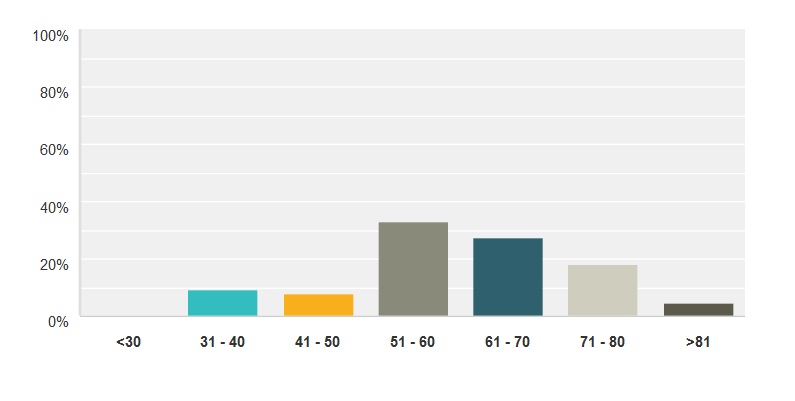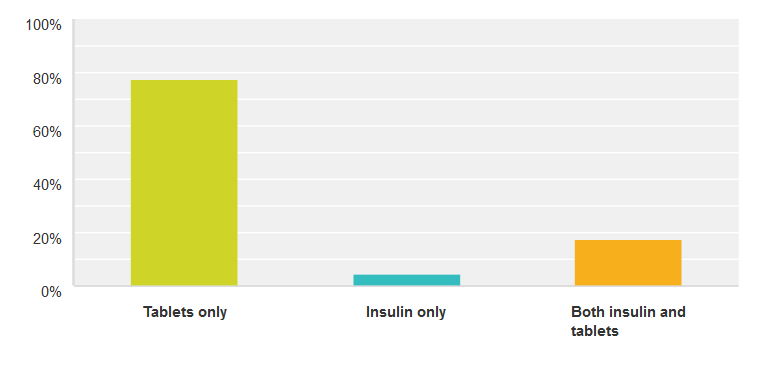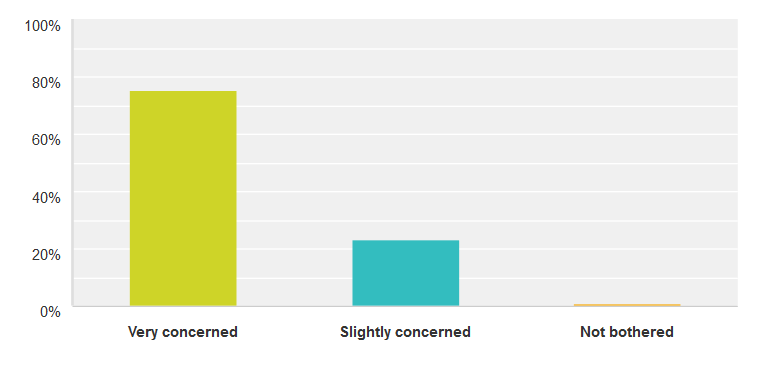If you are a part of our email list, a while ago I sent across an email requesting you to fill out a short survey. This was conducted to see how much our patients understand about diabetes.
I collected the responses of 88 patients who have suffered from diabetes for varying duration. I was quite surprised with the results, and I thought I would share them here with you today.
I have started off with each question that was asked in the survey, and will give you the results individually for them as well.
How Old Are You?

As you can see, most of our patients fell in the older age group between 51 to 80 years. 32.95% of the study population were in the 51 – 60 year age bracket.
From clinical studies, it has been found that most patients develop diabetes after the age of 40 years. Our study group had no patients in the age of 30 years and below, though we do see a few such patients in our clinic.
What Is Your Gender?

62.07% were men and 37.93% women in the study group. This is not really surprising.
Clinical studies have also shown that men are more likely to develop diabetes when compared to women. This is because the weight gain required to increase the risk of diabetes is lesser in men.
In other words, women need to gain more weight compared to men to develop diabetes. This takes a lot longer to happen. It is believed this is because men are less sensitive to insulin compared to women.
How Long Have You Had Diabetes For?

This was quite well distributed. Most of our patients (22.35%) of them had recent onset diabetes. Following them closely was patients who had diabetes for 15 – 20 years (21.18%).
Are You taking Insulin, Tablets Or Both?

77.65% of the study group were taking tablets alone. The number of patients on insulin only was only 4.71%.
Type 2 diabetes is managed mostly with medicines. Insulin rarely plays a role in the early stages, unless the sugar levels are very high.
In the early stages of diabetes, insulin is produced normally by the pancreas, but the body does not respond to it. In other words, the body becomes insulin resistant. Only tablets are sufficient in this stage.
Later on, the quantity of insulin produced begins to increase. This is because the body thinks that there is insufficient insulin as the sugar is not entering the tissues. This phase is called hyperinsulinemia phase.
As time passes, the insulin production itself starts to reduce. The body becomes insulin deficient. This is where insulin is needed.
So, if you doctor prescribes insulin for you, don’t think of it as a bad thing. It just means your body requires it to keep the blood sugar levels under control. It does not mean you have failed in managing your diabetes.
I have not done too detailed an analysis here, but will post one once I have had a chance to sift through the data.
Do You Have A Full Understanding Of Diabetes And Its Complications?

This was an interesting result, and I will explain why later.
62.96% of the study group felt they had a good understanding of diabetes and the complications associated with it. Only 1.23% felt they did not understand it.
This finding is contrary to some published studies (such as this one) where a majority of patients were found to have a poor understanding of diabetes. For example, in the mentioned study previously, out of 101 patients, only 50 knew that diabetes affected the kidney.
So how did our study group do?
Which Of The Following Organs Does Diabetes Affect?

This was interesting as well.
I was reassured to see that 91.25% of the patients in our study group knew that diabetes affected the kidneys. 85% recognized its effects on the eyes.
However, I was disappointed to see that only 68.75% knew that diabetes affected the heart. In other words, 1 out of 3 patients had no idea that diabetes could cause heart attacks. Only 38.75% thought it affected the nerves while only 27.5% of the group recognized its effects on the brain. Only 36.25% felt it affected the liver.
The complications of diabetes are many, and affect every organ listed above. The most worrying effects are on the kidneys, heart and brain, though knowledge regarding this seemed scattered.
Diabetes can cause kidney damage (diabetic nephropathy), heart attacks (silent ones), stroke, neuropathy i.e. nerve damage and retinal damage in the eyes. It is a leading cause of cryptogenic cirrhosis – a condition of the liver with a high mortality.
Here is something surprising I noticed.
Some of the patients who stated they had a good understanding of diabetes and its complications only marked a single organ or just 2 of them to be affected by diabetes. It may well be that they have a misconception of how well they know their condition.
I feel we as doctors have more of a responsibility in educating our patients regarding diabetes and its effects. There are many ways to do this of course, through teaching groups, magazines and other methods.
How Concerned Are You About Having Diabetes?

Phew!
I was thrilled to see that most of our patients were either very concerned or had some degree of concern regarding their diabetes. Only 1.16% were not bothered (1 patient out of 88).
But it brings to my mind this question – why is it that with this level of concern do our patients still not understand their condition sufficiently well?
Maybe it is something us doctors need to address.
Do You Think Doctors Do A Good Job Explaining Diabetes To Patients?

Yikes! One out of every 4 patients thought that doctors don’t take the time to explain diabetes to their patients.
Honestly, I do feel bad about this. The likely reason is our busy schedules, but maybe it would be better to have a system in place where patients can relax and chat with someone about their diabetes.
There are many centers that do this, but I think there is a lack of awareness regarding this. Diabetes educators working in collaboration with a certified dietitian and diabetes nurse would most certainly help.
Any suggestions?
Do You Find It Difficult To Find Reliable And Trustworthy Information Online Regarding Diabetes?

67.9% of patients stated they had no difficulty finding information online.
An informed patient is a healthy patient. An informed patient is a happy patient.
I quote you a statement from a paper by Parker RM published in the journal Pharmacoeconomics in 2006 –
Rightly said, if you think about it.
Another interesting finding from another paper was the finding that the knowledge deficiencies are more in women than in men. This study was conducted in Ludhiana.
The medical fraternity needs to boost its efforts in imparting knowledge about diabetes. With the exponential increase in the number of patients with diabetes, now is the right time.
Comments
I conducted this little study as my father and I were wondering one day how well our patients understand how serious diabetes is.
While the results are slightly disappointing, they are not really that surprising. Similar findings have been seen in more robust and well organized studies published years ago, and it appears not much has changed.
I am thankful to all the patients who took the time to fill out the questionnaire, both in clinic and online. The questions you have asked are pertinent ones, and the answers to these will be published in a book which will be on sale in the next couple of months.
This exercise has been a learning one, and I hope that those from the medical profession who read it may work on a plan to implement strategies of educating the public in their homes or through meetings regarding diabetes and its management.
References
- Understanding Iron Deficiency Anemia: A Guide for Patients - May 31, 2025
- CT Coronary Calcium Score: A Guide for Patients - January 7, 2024
- Gastric Antral Vascular Ectasia (GAVE) – Causes, Diagnosis, and Treatment - August 5, 2023


It is really assuring for me that I am undergoing treatment with both father and son
Doctors who are specialists in the field of diabetes and its attended diseases and I have the
confidence that I can rush to you in case of any emergency.
But lots have to be done in the field of treatment,including home care.
H.C.Ranganathan 79
Thank you for your kind words!
Thank you for your good analysis. I am benefited. Looking forward for the release of your book.
B.G. Rao
Camp. Chandigarh.
Thank you very much!